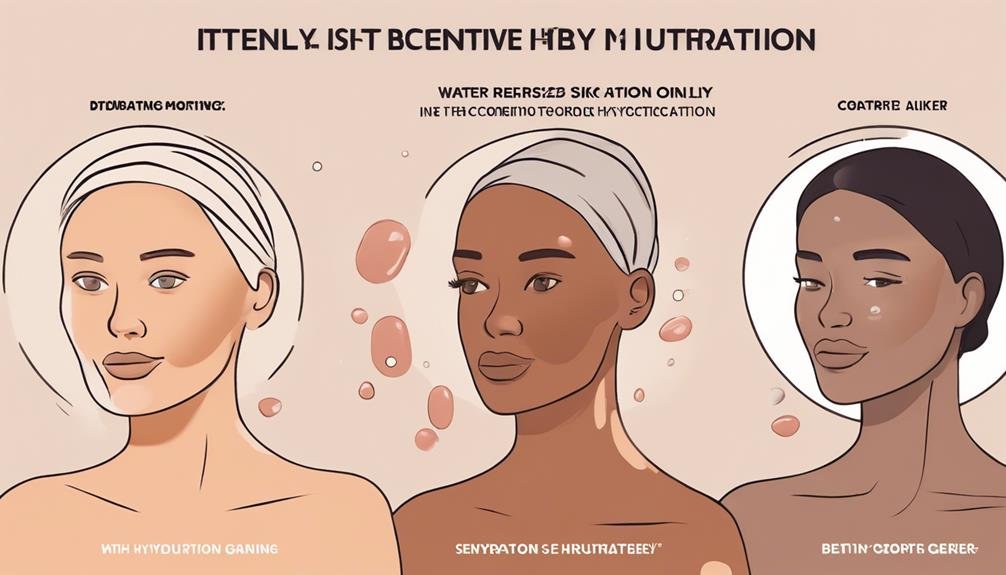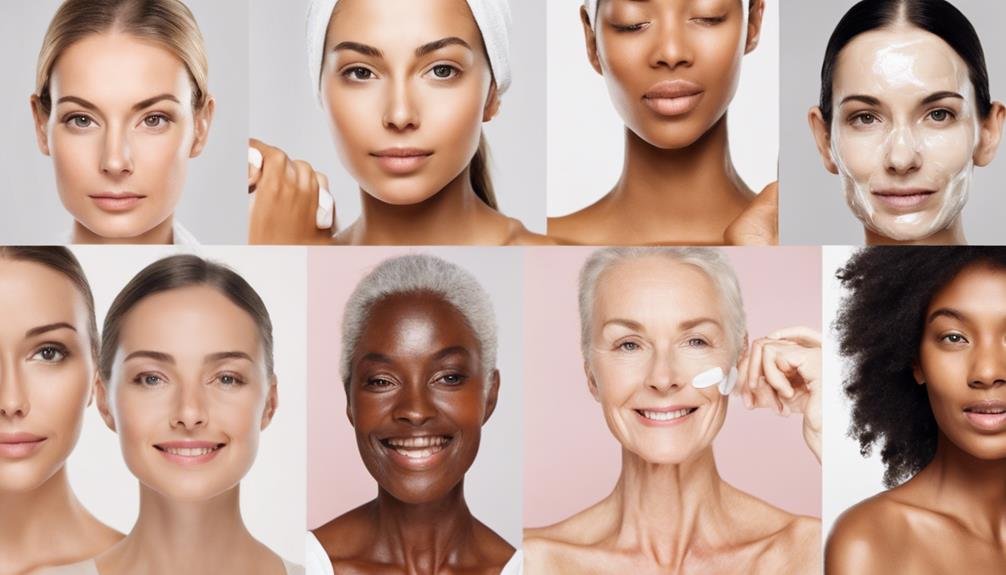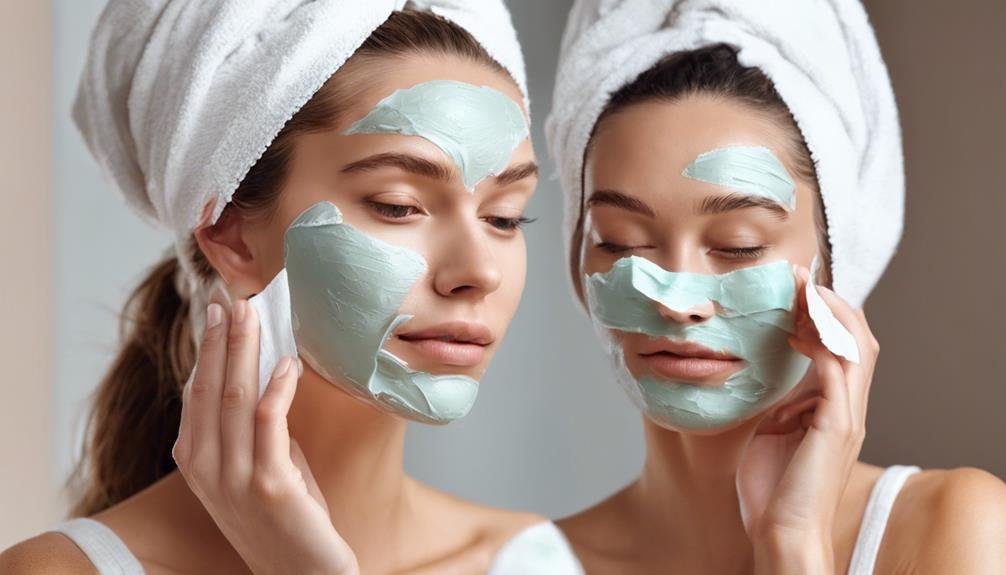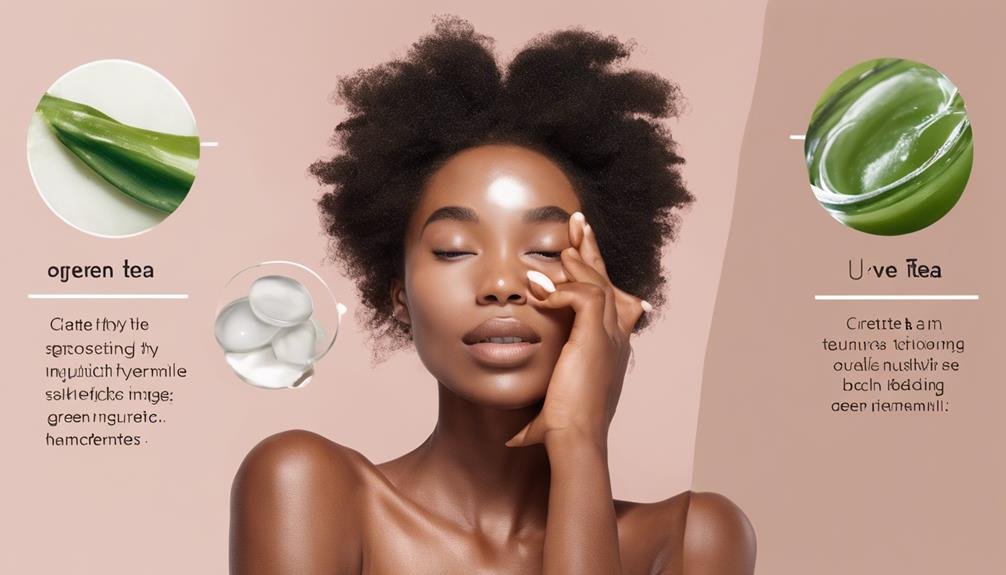To achieve healthy, glowing skin, tailoring your skincare routine to your skin type is essential. From managing oily skin to addressing redness, each skin type requires specific care. By understanding the unique needs of your skin, you can effectively target concerns and enhance your complexion. So, whether you're looking to control excess oil, brighten your skin, or soothe redness, these top skincare tips cater to every skin type.
Key Takeaways
- Choose a gentle cleanser suitable for your skin type to remove dirt and impurities.
- Use the right exfoliant for your skin type to unclog pores and remove dead skin cells.
- Moisturize with non-comedogenic products suitable for your skin type to protect the skin barrier.
- Always apply sunscreen with at least SPF 30 to protect your skin from UV damage.
- Stay hydrated by drinking enough water daily and using moisturizers with hydrating ingredients.
Cleansing
When it comes to skincare, cleansing is a fundamental step that sets the foundation for a healthy complexion. Proper cleansing helps remove dirt, oil, makeup, and other impurities that accumulate on your skin throughout the day. It's essential to choose a gentle cleanser that suits your skin type to avoid stripping away natural oils or causing irritation.
For dry skin, opt for hydrating cleansers with ingredients like hyaluronic acid or glycerin. If you have oily skin, look for foaming cleansers or those containing salicylic acid to help control excess oil production. Combination skin benefits from a mild cleanser that can address both oily and dry areas without imbalance.
It is recommended to cleanse your face twice a day, in the morning and evening, to maintain skin health. Avoid using hot water, as it can be harsh on the skin, and always pat your face dry with a clean towel to prevent irritation.
Exfoliation
For optimal skin health, incorporating exfoliation into your skincare routine is essential. Exfoliation helps remove dead skin cells, unclog pores, and reveal brighter, smoother skin. However, it's important to exfoliate gently and choose the right type of exfoliant based on your skin type. Here is a table outlining different exfoliation methods for various skin types:
| Skin Type | Recommended Exfoliant |
|---|---|
| Dry | Chemical exfoliants like AHAs or BHAs, with hydrating ingredients. |
| Oily | Salicylic acid-based exfoliants or physical scrubs with gentle beads. |
| Sensitive | Enzyme exfoliants or mild scrubs with rounded particles to avoid irritation. |
Moisturizing
To maintain healthy and hydrated skin, moisturizing is a crucial step in your skincare routine. Regardless of your skin type, using a moisturizer tailored to your specific needs can make a significant difference in the overall health and appearance of your skin. Moisturizers work by trapping existing moisture in your skin and providing an additional layer to prevent water loss.
For oily skin, opt for non-comedogenic, oil-free moisturizers to prevent clogged pores and breakouts. Dry skin benefits from heavier, cream-based moisturizers that provide intense hydration. Combination skin can benefit from using different moisturizers on specific areas of the face.
When selecting a moisturizer, look for ingredients like hyaluronic acid, glycerin, ceramides, and squalane, which help to hydrate and repair the skin barrier. Apply your moisturizer on damp skin to lock in moisture effectively. Remember to moisturize both morning and night to keep your skin supple and healthy.
Sunscreen
Proper sun protection is key in maintaining healthy skin, especially after moisturizing. Sunscreen is a crucial step in your skincare routine that shouldn't be overlooked. Here are some essential tips to help you effectively protect your skin from the sun's harmful rays:
- Choose the right SPF: Opt for a broad-spectrum sunscreen with an SPF of at least 30 to shield your skin from both UVA and UVB rays.
- Apply generously: Be sure to apply sunscreen generously to all exposed areas of your skin, including your face, neck, ears, and hands.
- Reapply regularly: Remember to reapply sunscreen every two hours, or more frequently if swimming or sweating.
- Protect your lips: Use a lip balm with SPF protection to prevent sun damage to your lips.
- Seek shade: Whenever possible, seek shade during the sun's peak hours, typically between 10 a.m. and 4 p.m., to minimize sun exposure and reduce the risk of skin damage.
Hydration
How crucial is proper hydration for maintaining healthy and radiant skin?
Hydration plays a vital role in keeping your skin looking its best. When your skin is well-hydrated, it appears plump, smooth, and vibrant. Dehydrated skin can lead to dullness, flakiness, and an uneven skin tone.
To ensure your skin stays hydrated, incorporate a high-quality moisturizer into your skincare routine. Look for products containing hyaluronic acid, glycerin, or ceramides, which help attract and retain moisture in the skin.
Additionally, drinking an adequate amount of water daily is essential for overall skin health. Water helps flush out toxins, keeping your skin clear and radiant from the inside out. Aim to drink at least eight glasses of water a day to maintain proper hydration levels.
Acne
Maintaining healthy and radiant skin involves more than just hydration. Acne can be a challenging skin concern, but with the right approach, you can manage it effectively. Here are some tips to help you deal with acne:
- Cleanse gently: Use a mild cleanser morning and night to remove excess oil and bacteria without stripping your skin.
- Avoid harsh products: Stay away from harsh scrubs and astringents that can irritate and inflame your skin.
- Moisturize daily: Opt for non-comedogenic moisturizers to keep your skin hydrated without clogging pores.
- Use spot treatments: Apply targeted treatments with ingredients like benzoyl peroxide or salicylic acid to treat active breakouts.
- Protect your skin: Always use a broad-spectrum sunscreen to prevent acne scars from darkening and protect your skin from further damage.
Anti-aging
For those seeking effective ways to address signs of aging in their skincare routine, understanding how to combat the effects of aging on the skin is crucial. Aging skin is characterized by a decrease in collagen production, leading to fine lines, wrinkles, and sagging. To tackle these concerns, incorporating products with ingredients like retinol, vitamin C, and peptides can help boost collagen synthesis and improve skin elasticity.
Retinol, a derivative of vitamin A, is renowned for its ability to stimulate cell turnover and reduce the appearance of wrinkles.
Vitamin C is a powerful antioxidant that can brighten the skin, even out skin tone, and protect against free radical damage.
Peptides are amino acids that promote collagen production, helping to firm and plump the skin.
In addition to using targeted skincare products, adopting healthy lifestyle habits such as wearing sunscreen daily, staying hydrated, eating a balanced diet rich in antioxidants, and getting enough sleep can further support your skin in maintaining a youthful appearance. Remember, consistency is key when it comes to anti-aging skincare.
Sensitivity
To effectively care for sensitive skin, it's essential to understand the unique challenges and considerations that come with this skin type. Sensitive skin can react adversely to various triggers, leading to redness, irritation, and discomfort. Here are some tips to help you manage and care for your sensitive skin:
- Patch Test: Always patch test new products on a small area of your skin to check for any adverse reactions before applying them to your face.
- Gentle Cleansing: Use a mild, fragrance-free cleanser to avoid stripping your skin of its natural oils and causing irritation.
- Moisturize Regularly: Opt for a hypoallergenic, non-comedogenic moisturizer to keep your skin hydrated and protected.
- Sun Protection: Shield your skin from harmful UV rays by applying a broad-spectrum sunscreen with at least SPF 30 daily.
- Avoid Harsh Ingredients: Steer clear of products containing alcohol, artificial fragrances, and sulfates that can aggravate sensitive skin.
Oil Control
Effective oil control is crucial for maintaining balanced and healthy skin. Managing excess oil can help prevent breakouts and keep your skin looking fresh. Here are some tips tailored to your skin type:
| Skin Type | Recommended Products | Tips |
|---|---|---|
| Oily | Oil-free moisturizers | Use a gentle cleanser twice a day to prevent clogged pores. Blotting papers can help control shine throughout the day. |
| Combination | Mattifying primers | Focus on a gentle skincare routine. Use products that target oily areas while hydrating drier areas. Exfoliate regularly to prevent build-up. |
| Acne-Prone | Salicylic acid cleansers | Look for non-comedogenic products. Treat acne with targeted spot treatments and avoid over-drying the skin. |
Brightening
Brightening your skin can help achieve a radiant and youthful complexion. When looking to brighten your skin, consider the following tips:
- Exfoliate Regularly: Removing dead skin cells can reveal a brighter complexion underneath.
- Use Vitamin C: Incorporate a vitamin C serum into your skincare routine to help brighten and even out your skin tone.
- Stay Hydrated: Drinking plenty of water helps maintain skin hydration, leading to a more radiant appearance.
- Apply Brightening Masks: Treat your skin to masks containing ingredients like niacinamide or kojic acid to help brighten and fade dark spots.
- Protect from UV Damage: Always apply sunscreen to prevent UV-induced pigmentation and maintain a bright complexion.
Redness
If you struggle with redness in your skin, managing this issue can help you achieve a more even and calm complexion. Redness is often caused by inflammation, sensitive skin, rosacea, or environmental factors.
To combat redness, it's crucial to use gentle skincare products free of irritants like fragrances and harsh chemicals. Opt for products with soothing ingredients like aloe vera, chamomile, green tea, or niacinamide, known for their anti-inflammatory properties.
Additionally, consider incorporating a daily sunscreen with at least SPF 30 to protect your skin from UV damage, which can exacerbate redness. When dealing with redness, avoid hot water and harsh exfoliants that can further irritate the skin.
Instead, opt for a gentle cleansing routine and products specifically formulated for sensitive skin. Consulting with a dermatologist can also provide personalized recommendations for managing redness and maintaining a healthy skin barrier.
Combination Skin
To effectively care for combination skin, it's important to understand its unique characteristics and tailor your skincare routine accordingly. Combination skin is characterized by having both oily and dry areas on the face, making it essential to find a balance in your skincare regimen. Here are some tips to help you manage combination skin effectively:
- Use a gentle cleanser: Opt for a mild, non-stripping cleanser to remove impurities without over-drying the skin.
- Incorporate a lightweight moisturizer: Choose a moisturizer that's oil-free and hydrating to nourish dry areas without adding excess oil to the T-zone.
- Spot treat oily areas: Use targeted treatments like salicylic acid or benzoyl peroxide on oily zones to control breakouts.
- Apply sunscreen daily: Protect your skin from UV damage by using a broad-spectrum sunscreen with at least SPF 30.
- Consult a dermatologist: If you struggle to manage your combination skin, seek professional advice to develop a personalized skincare routine.
Frequently Asked Questions
How Can I Reduce the Appearance of Large Pores on My Skin?
To reduce the appearance of large pores on your skin, cleanse regularly to remove excess oil and debris. Use products with salicylic acid or retinol to unclog pores. Exfoliate gently to keep pores clear and minimize their visibility.
What Is the Best Way to Tackle Stubborn Blackheads?
To tackle stubborn blackheads, cleanse your skin with salicylic acid to unclog pores. Exfoliate regularly using a gentle scrub or a face brush. Apply a clay mask weekly to absorb excess oil. Hydrate well to maintain skin balance.
Are There Any Natural Remedies to Soothe Irritated Skin?
If you're dealing with irritated skin, consider natural remedies like aloe vera, oatmeal, or honey. These ingredients have soothing properties that can help calm redness and inflammation, providing relief for your sensitive skin.
Can Diet Affect the Overall Health and Appearance of My Skin?
Your diet significantly impacts your skin's health and appearance. Consuming a balanced diet rich in vitamins, minerals, and antioxidants can promote clear, glowing skin. Remember, what you eat plays a vital role in nurturing your skin.
What Skincare Ingredients Should I Avoid if I Have Rosacea?
Avoid harsh ingredients like alcohol, witch hazel, and fragrances in skincare products if you have rosacea. Opt for gentle, non-comedogenic, and soothing ingredients like aloe vera, chamomile, and hyaluronic acid to calm and hydrate sensitive skin.
Conclusion
In conclusion, taking care of your skin involves understanding its specific needs and choosing the right products and routines. While it may seem overwhelming at first, remember that consistency is key. By following these top skincare tips tailored to your skin type, you can achieve healthy, radiant skin. Don't let the variety of products and routines deter you – start simple and gradually incorporate new practices to find what works best for you. Your skin will thank you in the long run.







